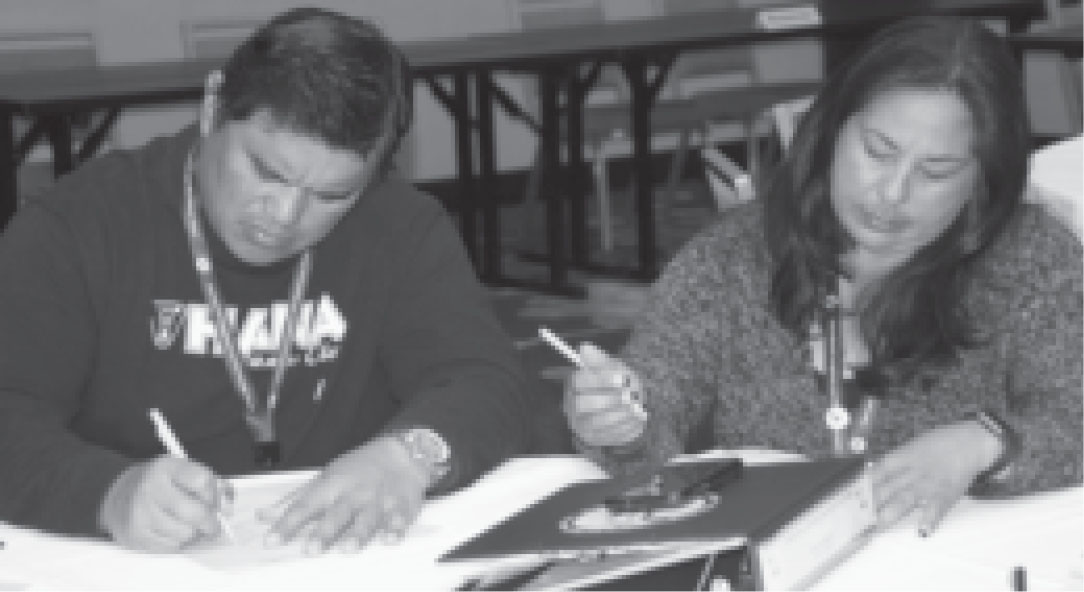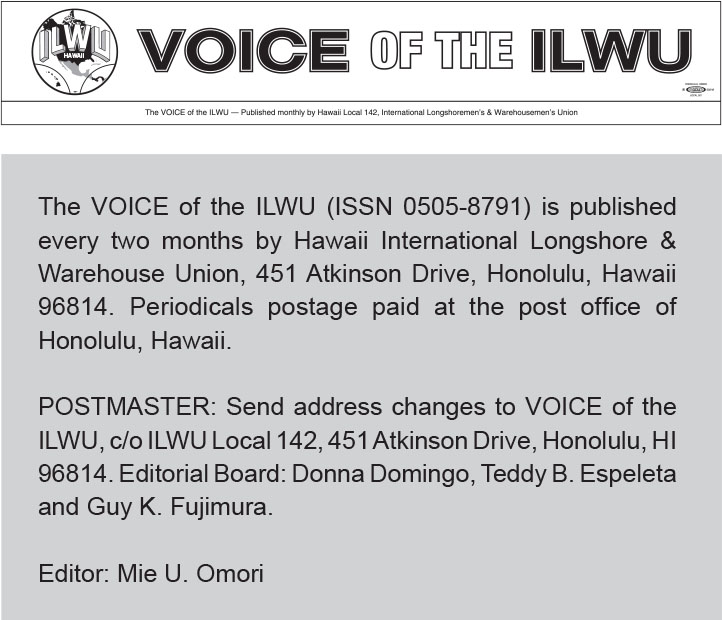A diverse group of 100 rank-andfile members and elected leaders attended the ILWU’s Leadership, Education and Development (LEAD) training in Seattle on May 7-12. The week-long education program seeks to provide tools that attendees can take back to their local unions that will encourage new leadership and more membership involvement -- both fundamental tenants of the ILWU belief that strong unions are built from the bottom-up.
Practical skills
Dozens of exercises were conducted throughout the week, emphasizing active participation and collaborative problem-solving skills. Participants learned practical skills, including how to run a successful union meeting, how to increase member involvement, how to speak confidently in public, and how to communicate a positive, public-interest union message to the news media.
Opening remarks
ILWU International President Robert McEllrath opened the training, emphasizing that leadership comes in many forms and is not limited only to those holding elected union office. He reminded everyone that the ILWU’s strength comes from an active and engaged rank-and-file, not a “top down” leadership style.
“Does a leader have to be the president or secretary-treasurer of the local?” asked McEllrath. “Absolutely not,” he answered. “You’ll see a leader stand up in a union meeting and speak their mind, ask questions and go through the democratic process of our union. It’s you, the rank-and-file, who are going to make this union work.”
Keynote address
On the second day of the training, a keynote address was delivered by Dr. Steven Pitts, an economist at UC Berkeley’s Labor Center. He focused on America’s growing inequality, explaining that wages for workers no longer rise with higher productivity.
During the decades follwing WWII until the late 1960s, Pitts said wages rose along with productivity, allowing workers to share the benefits of producing goods and services more efficiently. Pitts said that wages have been stagnant for several decades despite rising productivity levels. More profits from higher productivity are now going into the pockets of the super-rich.
“Workers in this country have been beaten down for 40 years, and that beat-down is a result of workers lacking power,” Pitts said. He stressed that workers can begin to reverse this trend by starting a common vision and shared values about the kind of world they want to see in the future. Pitts then led participants in a group exercise to develop that shared vision.
Presentations and group exercises that afternoon focused on how to make union meetings more effective and how different personality types and “working styles” can collaborate to make an effective team. Those sessions were facilitated by Joel Schaffer and Rick Ogelsby of the Federal Mediation and Conciliation Service (FMCS). That was followed by a session on Robert’s Rules of Order,” which is the process used by the ILWU and other bodies to assure orderly debate and decisionmaking. This session was led by Local 8’s Jim Daw and Local 52’s Max Vekich; both have served as parliamentarians at Longshore Caucuses and ILWU Conventions.
ILWU’s 10 Guiding Principles
The third day started with a discussion about the ILWU’s Ten Guiding Principles, led by pensioner Rich Austin, Sr., who presented an overview of the principles and their history. A panel discussion followed with IBU Secretary-Treasurer Terri Mast, Local 5 Union Representative Ryan Takas and Local 19 President Rich Austin, Jr., who explained the importance of the Guiding Principles and how they have shaped the union. Following the panel discussion, workshop participants voted for what they felt were the most important principles, listing favorites at one of the ten easels set up around the room.

ILWU Local 142 Business Agent Joseph Aquino at the LEAD Institute in Seattle. Nine representatives from Local 142 attended the event.
Bridging the ‘generations gap’
Later that afternoon, conference participants discussed the need to develop and involve young leaders in the union. A discussion on “bridging the generation gap” began with a brainstorming session that explored the perspectives of younger and older workers led by Gary Hattal and Ligia Velazquez of FMCS. A panel discussion followed with ILWU Canada Second Vice-President Steve Nasby, Local 5 Secretary-Treasurer Amy Wren, ILWU 23 President Dean McGrath, Tacoma Pensioners President Mike Jagielski, and Local 23 B-Man Brian Skiffington. Panelists explained how their locals are developing younger and newer leaders. Nasby discussed Canada’s annual “Young Workers Conference” along with efforts to include ID Casuals in education and other union programs. The Tacoma delegation talked about their Young Workers’ Committee that built strong bonds between Local 23 pensioners and younger Tacoma longshore workers.
“We brought together young workers who are hungry for knowledge about the ILWU and the industry, and you have this group of pensioners who are eager to share their knowledge and experience. It’s a powerful combination,” said Mike Jagielski.
Local 5’s Amy Wren talked about the challenges of building union culture at Powell’s where the turnover rate is much higher than the longshore industry, and most workers have no personal or family experience with unions before working at Powell’s.
Automation
On day four, ILWU International Vice President Ray Familathe gave a multimedia presentation that explained the growing threat of automation on the docks, in the trucking industry, and in warehouses and hotels.
“I’m tired of being lied to by politicians,” said Familathe. “I don’t think there’s a politician on either side of the aisle who understands where this technology is going and what is going to happen to working people over the next few years. We need to challenge these politicians on where they stand on automation and how they expect public services can continue to be funded if more and more workers are displaced by robots.”
Communications workshop
The ILWU communications staff held a workshop in the afternoon of day four. Topics included internal and external communications strategies, developing publicinterest messages, flyer design and public speaking. The workshop was interactive, and participants worked in small groups to practice public speaking, produce their own flyers and develop messages that combined union issues with broader public concerns.
Closing address
On the final day, ILWU International Secretary Treasurer Willie Adams delivered closing remarks to the conference. He
continued on page 6...

